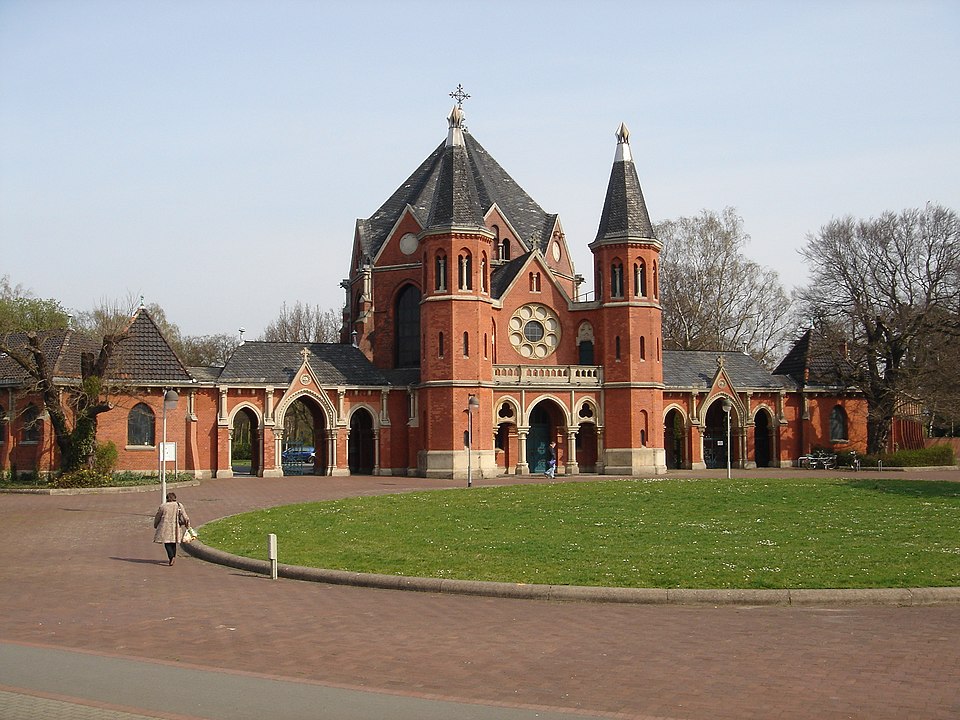When I studied in Hanover, Germany I lived in a district called Stöcken. I passed the Stöcken Friedhof (Stöcken cemetery) every day on my way to school, the library, or the grocery store.
My friend and I would actually go for a walk there since the cemetery is really more of a park with graves. There are trees, flowers, bushes, a lake, benches, and walkways.
I know that the Stöcken Cemetery is not necessarily a representation of every cemetery in Germany but even the smaller ones seem to be closer to nature than the ones I have seen in Pennsylvania. I am aware that in the US, too not every cemetery looks the same, however generally speaking I feel they are exposed and cold.


The Stöcken cemetery is the second oldest city cemetery in Hanover, having been founded in 1891. It has a chapel and a wall that surrounds the park.
Many graveyards in Europe are close to a church and many of them have some kind of fence or wall. This actually where the German word Friedhof comes from: eingefriedeter oder umfriedeter Hof. It means a yard or court that has been surrounded with a border like a fence or a wall to keep people out. Nowadays, people draw a connection between Friedhof and Frieden which means peace.


The Stöcken Friedhof has many graves that belong to known people but there are also memorials for soldiers who fell in World War I and II. The cemeteries department published a walkabout brochure, so you can visit some of the more important grave sites. It also helps not to get lost.
Fritz Haarmann's Victims
One of the bigger commemorative plaques belongs to the victims of serial killer Fritz Haarmann. He lured young boys and men into his apartment, sexually abused them and killed them by biting their Adam’s Apple and strangling them. After the murder, he cut up the body, sold parts of the meat, while he threw most of the body into the river Leine.

Between 1918 and 1924, Haarmann killed 24 boys and men, aged 10 – 22, was caught, tried and sentenced to death. In 1925, Haarmann was decapitated.
A song about Haarmann was written or made up, sung to the melody of the operaretta song “Warte, warte nur ein Weilchen, bald kommt auch das Glück zu dir” (Wait, wait just for a litte while, then good luck will come to you).
There are different versions and stanzas to the text but it’s something like this:
Warte, warte nur ein Weilchen,
bald kommt Haarmann auch zu dir,
mit dem kleinen Hackebeilchen,
macht er Schabefleisch aus dir.
Aus den Augen macht er Sülze,
aus dem Hintern macht er Speck,
aus den Därmen macht er Würste
und den Rest, den schmeißt er weg.
Wait, wait just a little while,
soon Haarmann will also come to you,
with his little cleaver,
he will turn you into ground meat.
From the eyes he’ll make brawn (or galantine),
From the behind he’ll make bacon,
From the guts he’ll make sausage,
and the rest he’ll throw away.



My brother recommended I would possibly like this website. Aubree Jephthah Constance
Thank you, I hope you do!
You can sign up to follow me by email (you’ll get an email when there is a new blog post), or you can follow me on instagram and facebook. I normally link my blog posts there too.
And feel free to contact me with suggestions or recommendations!